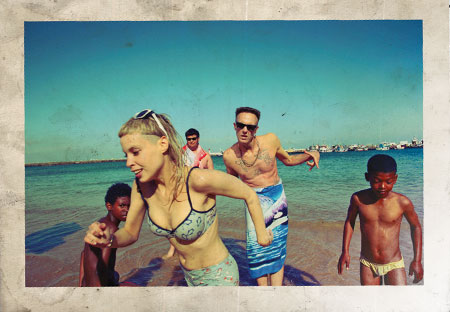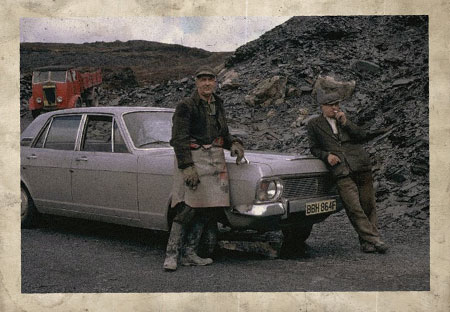zef is the answer
What is Zef? In the States white trash, in Australia bogan and in England chav are the words used for Zef. They are similar, but there is a big, important difference: South African Zefs are optimistic and proud of their culture. They tune up their mediocre cars in an elegant way and decorate them, and they’re proud of being working class. They’re either middle or working class but they always hold their heads high, believing themselves to be elegant, sexy and dignified. The relationship with cars is no coincidence. The name Zef comes from the Ford Zephyr. In the 1950’s 60’s and 70’s it was the South African workers’ favourite car. Although working in diamond and gold mines meant they were poor, they
were a long way from the upper class. Nor should it be forgotten that pillaging international companies do not exploit only black workers in South Africa: they also exploit a large white community. In fact, the South African elite starting calling those workers Zef because of the cars they drove.
Die Antwoord the people who are called Zef and who have spread the culture. In Afrikaans, Die Antwoord means “answer”. In fact, the most contemporary and social answer to the world from post-Apartheid South Africa has been Zef culture. We still see South Africa in terms of Apartheid and Nelson Mandela. While for the world South African culture means Paul Simon’s Graceland,
Johnny Cleeg & Sabuka, the Nobel prize winning novelist J.M. Coetzee Nobel and Charlize Theron, Die Artwood have shown us that all of that is no more than a cliché and that there has been a social and cultural explosion in South Africa over the last 30 years. While there still is racism today they show us that, in addition to the colour of your skin, your economic situation also gets you classified (this also happened in the Ford Zephyr era).
Die Antwoord was formed in 2007. The couple Ninja and Yo-landi ViSSer are at the centre of it all (DJ Hi-Tek has now joined them too). Since then they have played their high-speed electronic rap to audiences all over the world. They mix hip-hop and rave culture with South African street music rhythms and images, it’s like a dirty bomb that explodes in all your senses. They fill their songs with Afrikaans, Xhosa and English. Without any complexes whatsoever they sing about what they like and what they don’t like, always to a driving dance rhythms.
At first Die Antwoord’s aesthetics and image were completely innovative: it looked like a joke or like a precise marketing campaign. We were wrong. Zef culture, by that time, was the sound track in South Africa’s cities and towns. Die Antwoord have also pointed out the hypocrisy in music with their attitude. It’s well-known that mainstream artists want to get hold of anything “authentic” and make it their own in order to legitimise what they do and get closer to the street. When Lady Gaga asked them to open for her on her tour, Die Antwoord said no with their spectacular video Fatty Boom Boom . The group has received a lot of criticism. Making a case for money, drugs, sexism,
racism ... this group, which thinks for itself and says what it thinks without doubting it, is contradictory, there’s no denying that. Die Antwoord, on the other hand, don’t preach to you, don’t tell anyone how to live. They only explain how they live themselves. They say that they’re proud to be Zef with their ludic dance rhythms, and that freedom has caused a stir and shaken up all sorts of conservative points of view.
were a long way from the upper class. Nor should it be forgotten that pillaging international companies do not exploit only black workers in South Africa: they also exploit a large white community. In fact, the South African elite starting calling those workers Zef because of the cars they drove.
Die Antwoord the people who are called Zef and who have spread the culture. In Afrikaans, Die Antwoord means “answer”. In fact, the most contemporary and social answer to the world from post-Apartheid South Africa has been Zef culture. We still see South Africa in terms of Apartheid and Nelson Mandela. While for the world South African culture means Paul Simon’s Graceland,
Johnny Cleeg & Sabuka, the Nobel prize winning novelist J.M. Coetzee Nobel and Charlize Theron, Die Artwood have shown us that all of that is no more than a cliché and that there has been a social and cultural explosion in South Africa over the last 30 years. While there still is racism today they show us that, in addition to the colour of your skin, your economic situation also gets you classified (this also happened in the Ford Zephyr era).
Die Antwoord was formed in 2007. The couple Ninja and Yo-landi ViSSer are at the centre of it all (DJ Hi-Tek has now joined them too). Since then they have played their high-speed electronic rap to audiences all over the world. They mix hip-hop and rave culture with South African street music rhythms and images, it’s like a dirty bomb that explodes in all your senses. They fill their songs with Afrikaans, Xhosa and English. Without any complexes whatsoever they sing about what they like and what they don’t like, always to a driving dance rhythms.
At first Die Antwoord’s aesthetics and image were completely innovative: it looked like a joke or like a precise marketing campaign. We were wrong. Zef culture, by that time, was the sound track in South Africa’s cities and towns. Die Antwoord have also pointed out the hypocrisy in music with their attitude. It’s well-known that mainstream artists want to get hold of anything “authentic” and make it their own in order to legitimise what they do and get closer to the street. When Lady Gaga asked them to open for her on her tour, Die Antwoord said no with their spectacular video Fatty Boom Boom . The group has received a lot of criticism. Making a case for money, drugs, sexism,
racism ... this group, which thinks for itself and says what it thinks without doubting it, is contradictory, there’s no denying that. Die Antwoord, on the other hand, don’t preach to you, don’t tell anyone how to live. They only explain how they live themselves. They say that they’re proud to be Zef with their ludic dance rhythms, and that freedom has caused a stir and shaken up all sorts of conservative points of view.




